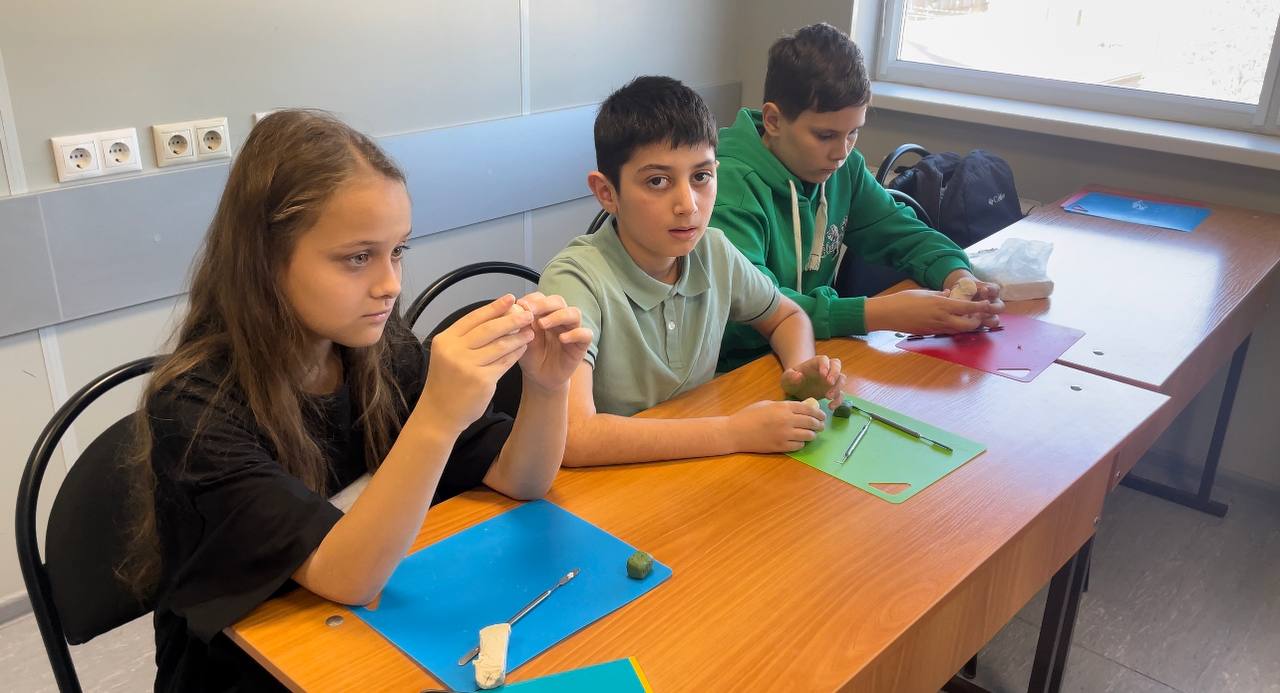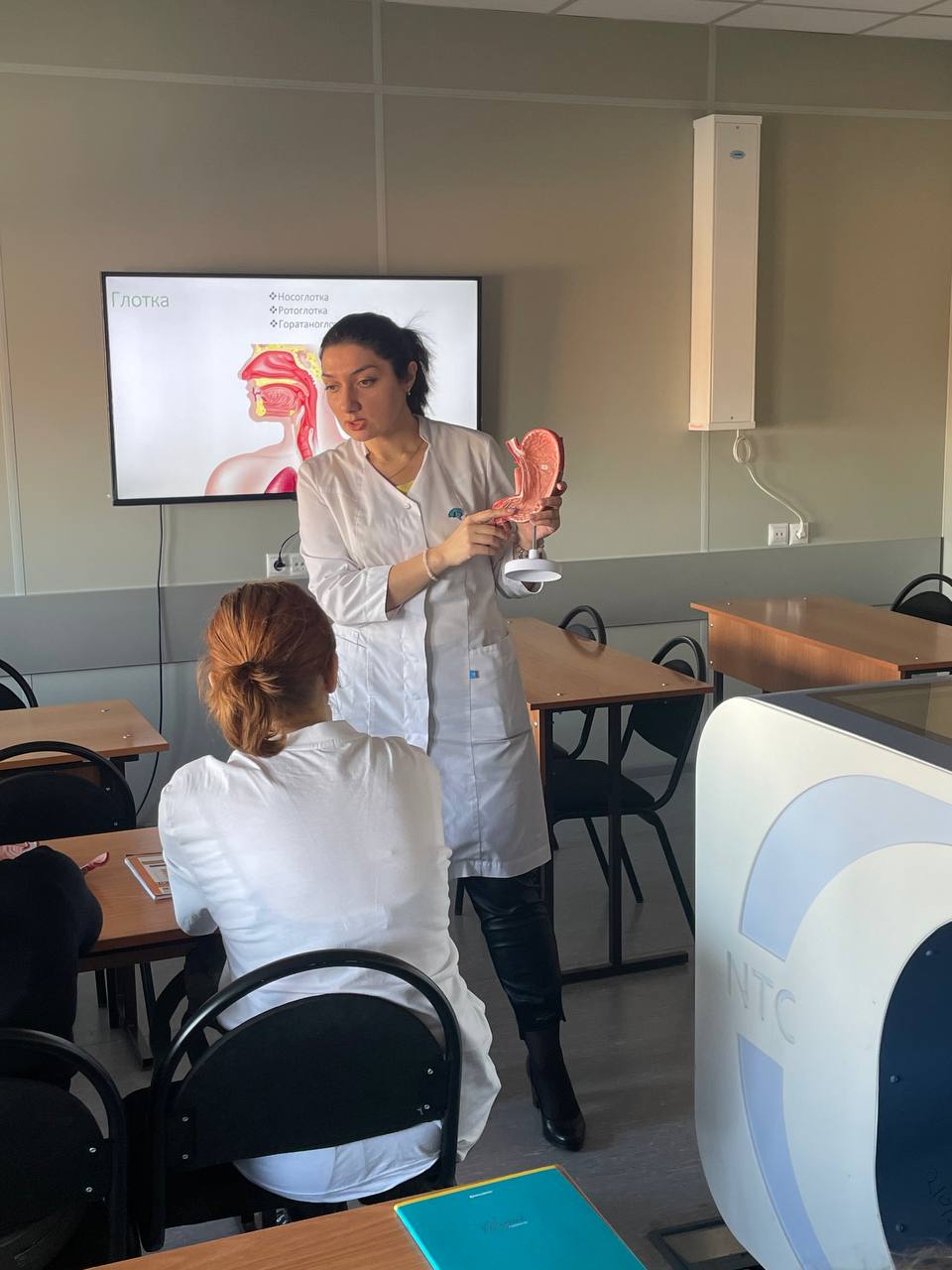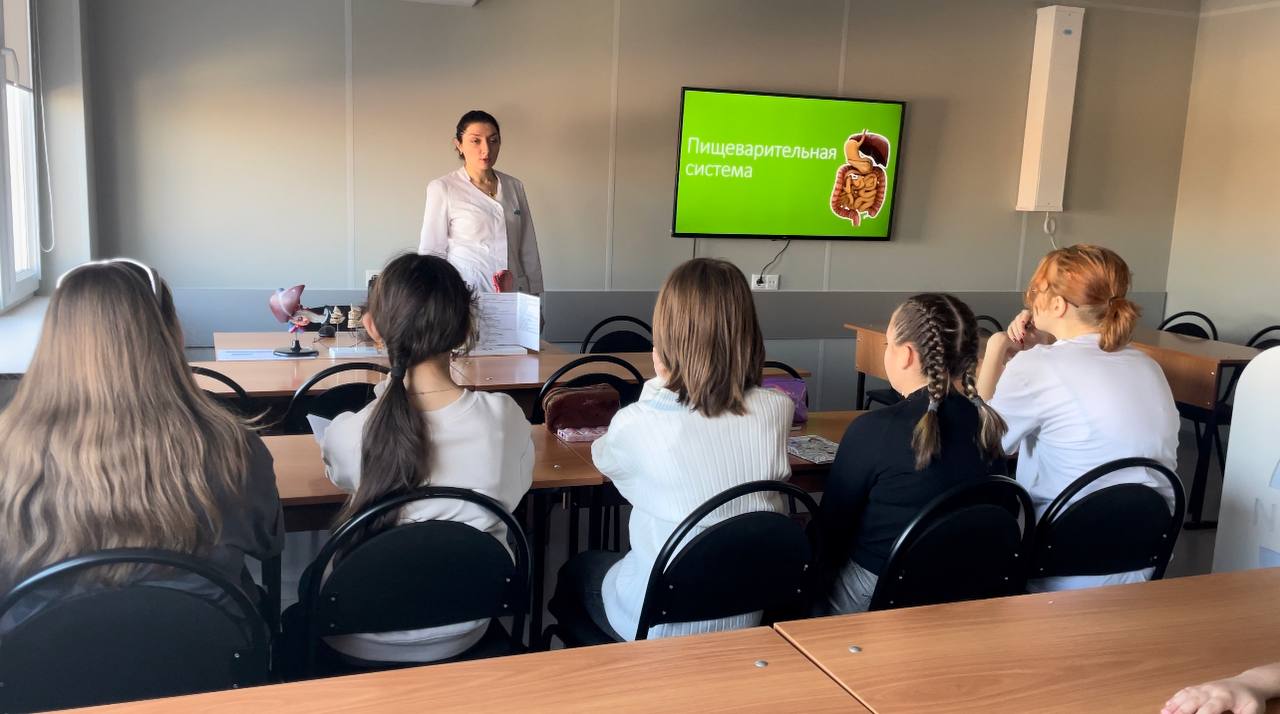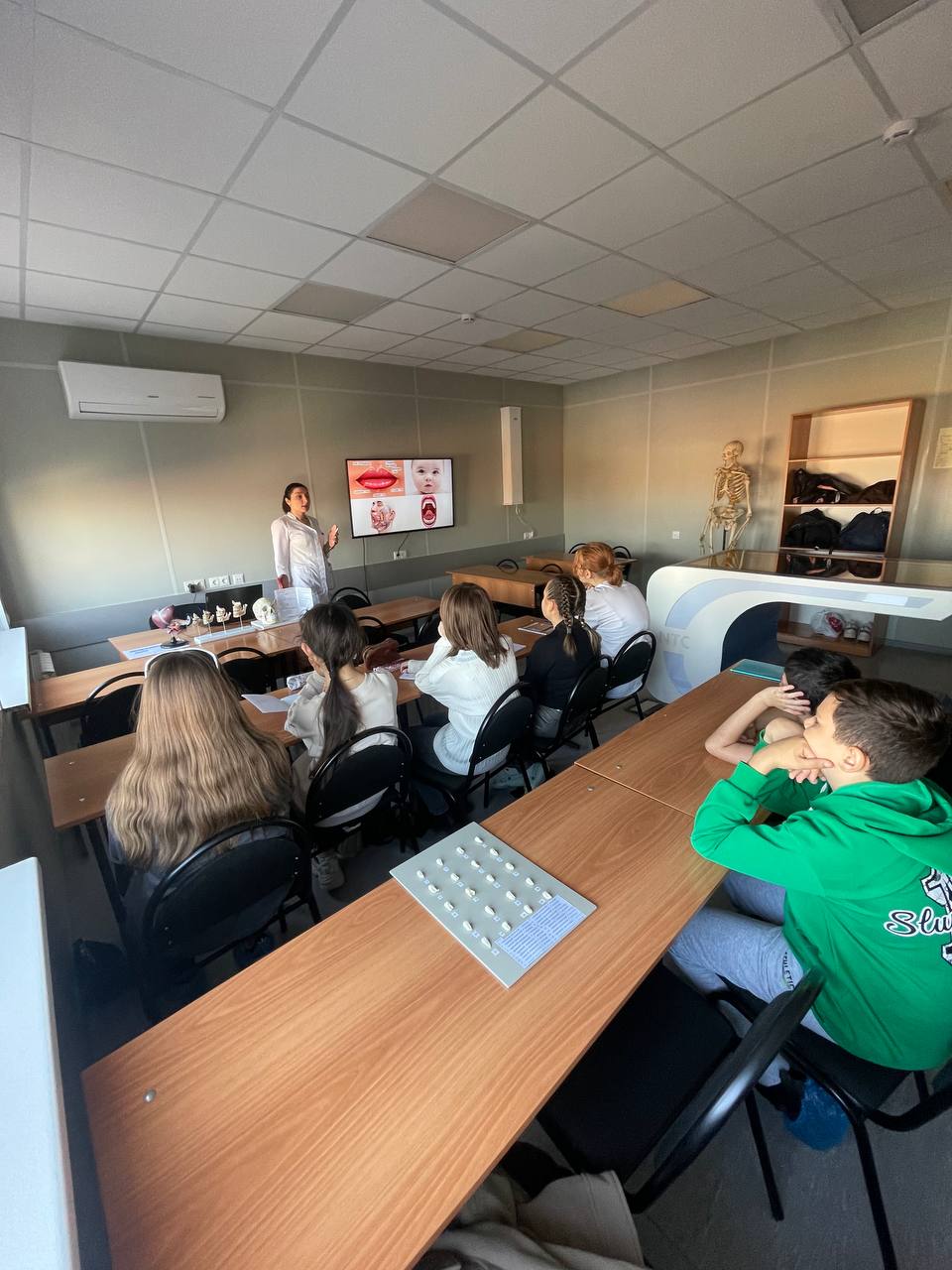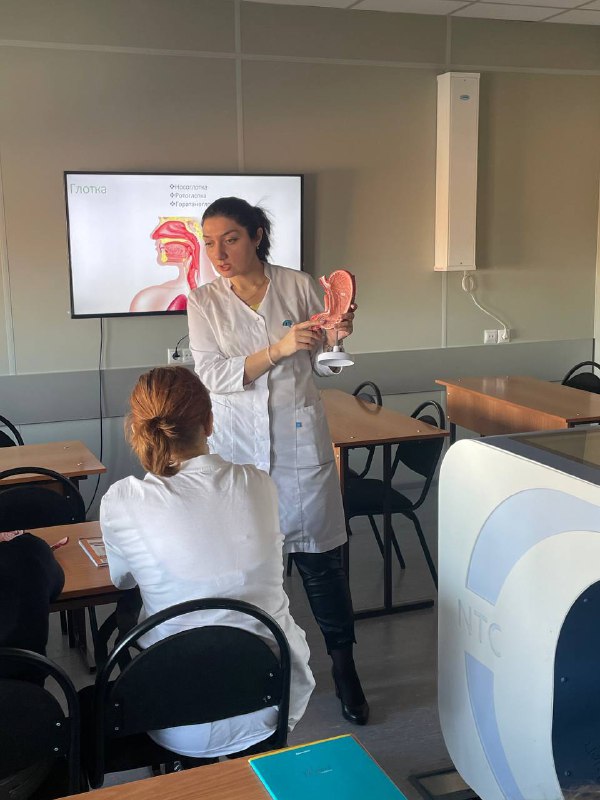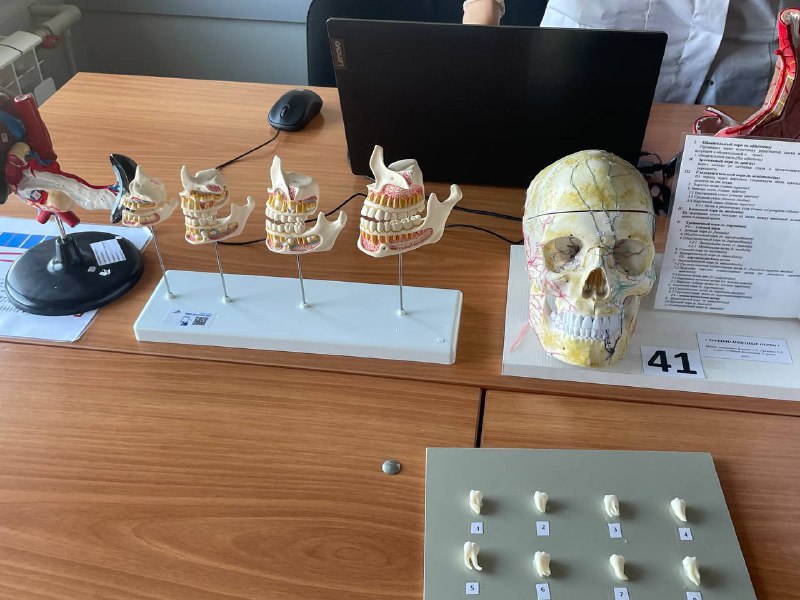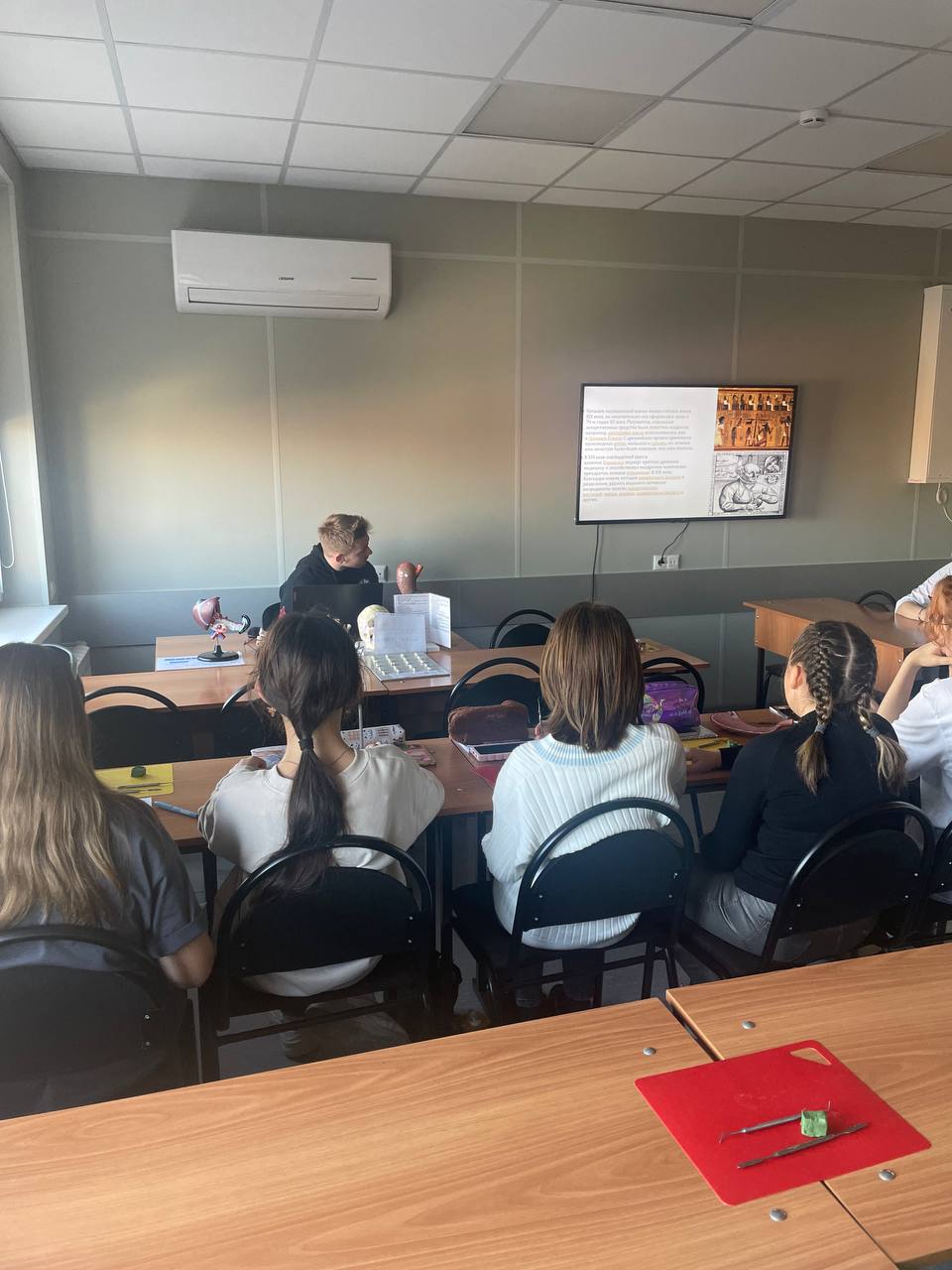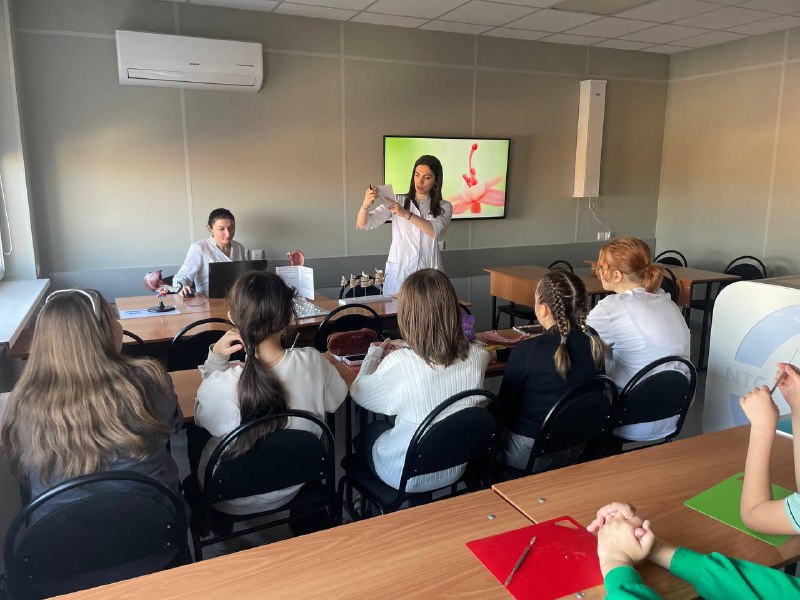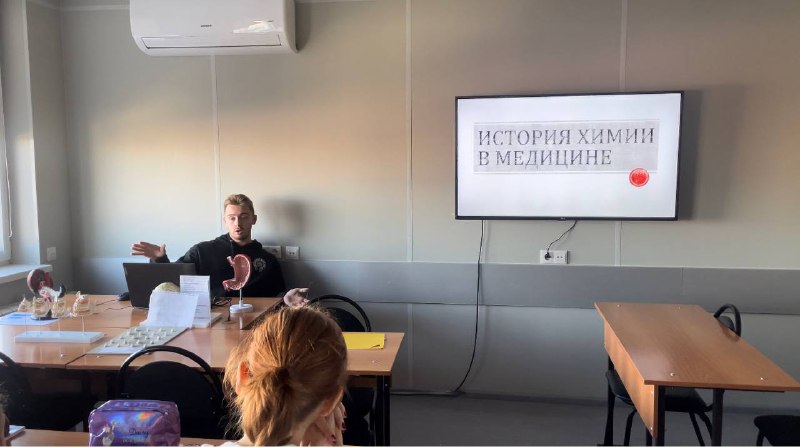On December 2, 2023, students of the young doctor’s school “EQUILIBRUM” continued career guidance classes with schoolchildren in grades 5-9 at the department of normal anatomy.2nd year student of the Faculty of Dentistry Kapieva Alexandria together with the teacher, assistant of the department of normal anatomy Arutyunyan Nanar Armoevna under the guidance of the head of the department, professor, Doctor of Biological Sciences.Sergey Egorovich Baibakov told schoolchildren about the structure of the human digestive system, the functions of each of its departments.2nd year student of the Faculty of Dentistry Artyom Shedko continued to develop schoolchildren’s teeth modeling skills using sculptural plasticine.1st year student of the Faculty of Medicine Yuri Vasilenko, as part of the “History of Science” project, spoke about the contribution to the development of chemistry by Anton Lavoisier, D.I.Mendeleev and M.V.Lomonosov.In addition, he mentioned the development of the concept of chemotherapy by Palul Ehrlich and the first developments of medicinal chemistry.The school of young doctors “EQUILIBRIUM” is supervised by:Vice-Rector for Academic Affairs, Head of the Department of Surgical Dentistry and Maxillofacial Surgery, Doctor of Medical Sciences, Professor Tatyana Vladimirovna GaivoronskayaDean of the Faculty of Dentistry, Head of the Department of Fundamental and Clinical Biochemistry, Doctor of Medical Sciences, Professor Ilya Mikhailovich BykovHead of the student scientific society “BIOCHEMISTRY”, head of the school for young doctors “EQUILIBRUM”, Associate Professor of the Department of Fundamental and Clinical Biochemistry, Ph.D.Balachevskaya Olga Vladimirovna
Fundamental and clinical biochemistry
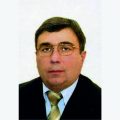
Career guidance master classes at the school of young doctors "EQLIBRIUM"
In the 1920s, the Kuban Medical Institute had 3 chemical departments: organic and inorganic chemistry, analytical chemistry and physiological chemistry. According to the staffing table of 1926, Associate Professor Drboglav A. N.I. N., St. assistant Ryabtseva V. N.V. N., Associate Professor Schreiber O. N.A. N., assistant Zhivillo A. N.I. N., worked at the Department of Inorganic and Organic Chemistry. Department of Physiological Chemistry – Professor Smirnov A. N.I. N. and assistant Pyatnitsky N.P. N.
During the 90 years of existence of the Kuban Medical Institute, and later the Kuban State Medical Academy and currently the Kuban State Medical University, the structure of teaching chemical disciplines has changed several times: organic chemistry was taught either with inorganic or biological chemistry, analytical chemistry was either an independent department, or combined with inorganic chemistry. The course of physical colloidal chemistry was taught at the Department of Biochemistry, then at the Department of General Chemistry.
Biological chemistry, since the establishment of the Kuban State Medical Institute, has been a course in physiological chemistry at the Department of Normal Physiology. In the early years of the Institute's existence, lectures on physiological chemistry were given by pharmacologist Professor D. N.P. N. Avrorov, and then by a student of I. N.P. N. Pavlov under the guidance of physiologist professor A. N.I. N. Smirnov. Practical classes in physiological chemistry were conducted at the Department of Normal Physiology of the Kuban Agricultural Institute by assistant S. N.A. N. Father.
In 1931, the Department of Biological Chemistry was established. Nikolai Petrovich Pyatnitsky, a graduate of the Kuban Medical Institute in 1926, who had worked all these years as an assistant at the Department of Normal Physiology, was appointed to serve as the head of this newly organized department.
In 1933, by order of the People's Commissariat of Health of the USSR, N.P. Pyatnitsky was confirmed as the head of the Department of Biological Chemistry, with the title of professor. During these years, Ph.D. N.M. N. K.N.P.N. Patrick and E. N.Z. Pushkareva worked as assistants at the Department of Biochemistry. N.P.N. Pyatnitsky, together with assistant E. N.Z. Pushkareva, wrote a "Workshop on Physiological Chemistry", which for a long time it remained the only textbook in this discipline. The results of scientific research, begun in Moscow and completed in Krasnodar, were formulated in the form of a doctoral dissertation, which was defended in 1938 by the Scientific Council of the Leningrad Military Medical Academy.
During the Great Patriotic War, the Department of Biological Chemistry together with the Institute was evacuated to Moscow.Tyumen. Professor N.P. N. Pyatnitsky was drafted into the Red Army at that time, where he served in hospital No. 2152.Sochi head of the department of severe traumatic brain injury. At the time when the medical institute was evacuated in the city of Tyumen, lectures on biological chemistry for students of the Kuban Medical Institute were given by academicians B. N.I. N. Zbarsky and S. Н.РН Mardashev, who were evacuated to this city with their first Moscow Medical Institute. In October 1943, the Kuban Medical Institute returned from evacuation to the city of Krasnodar, from where hospital No. 2152 was transferred, and Professor N. N.P. N. Pyatnitsky, once in his hometown, with the permission of the command of the North Caucasian Front, resumed teaching, combining it with service in the Red Army. Armies.
In the post-war years, courses in organic, physical and colloidal chemistry were transferred to the Department of Biological Chemistry. The course of lectures on organic chemistry has been taught for many years by a wonderful teacher, associate professor, and then professor, Sergey Ivanovich Krainev. His lectures were well equipped with visual aids, tables and drawings made by him personally. All these manuals carried elements of aesthetic education, and the "Practicum on Organic Chemistry" written by him went through several editions and remained the best in the country for many years.
Associate Professor of the Department of Inorganic Chemistry V. N.St. Somov was again involved in lectures on the course of physical colloidal Chemistry, and then they were read and conducted by PhD assistant of PhD Duklera. In subsequent years, the course of physical colloidal chemistry was conducted by associate professors: L. N.A. N. Kopteva, P. N.I. N. Burula, P. N.G. N. Storozhuk, S. N.P.N. Korochanskaya, M. N.D. Proskuryakov and L. N.V. N. Sushchinskaya and in the 80s, this course was transferred to the Department of General Chemistry, and then it was transformed into separate lectures on general chemistry.
In 1961, Pyotr Grigoryevich Storozhuk, a 1956 graduate of the Kuban State Medical Institute, entered graduate school in biochemistry. As a student, he worked as a laboratory assistant at this department for three years and was actively involved in the student scientific circle. As a third–year graduate student, he successfully defended his PhD thesis, and in 1971 - his doctoral thesis. In 1973, after the retirement of his teacher, Professor N.P. N. Pyatnitsky, he became head of the Department of Biological Chemistry, which he headed until 2004.
Since 1962, Associate Professor S. N.P. N. Korochanskaya has worked at the Department of Biochemistry. She is a senior lecturer at 30 kizoda, pedagogical attire, and methodological attire. In 1990, together with Professor N. P. N. G. N. Storozhuk and Associate Professor I. N.M. N. Bykov, she prepared a workshop on biological chemistry, which was republished in 1998 and adapted to the modern curriculum.
Since 1966, Associate professor L. N.V. N. Sushchinskaya has worked at the department, first as an assistant and then as an associate professor. In connection with the transition of medical universities to a new curriculum in the 80s, a new course in Bioorganic Chemistry was introduced, which was headed by Associate Professor L. N.V. N. Sushchinskaya. Dream up and learn from Sleep practicum and methodological development. Since then, bioorganic chemistry has been included in a single unit of biochemical training for a doctor.
Since 2004, the department has been headed by Doctor of Medical Sciences, Professor Ilya Mikhailovich Bykov. A new experimental and clinical stage of scientific research has begun at the department, the material and technical base has been significantly updated, and modern equipment for the laboratory of clinical biochemistry has been purchased. The following people joined the department from clinical medicine: Professor A. N.A. N. Basov (2004), Associate Professor K. N.I.N. Melkonyan (2007). Under the guidance of Professor I. N.M. N. Bykov, an innovative course in clinical biochemistry was organized, taught at the department since 2005 by Professors A. N.N. Kurzanov, I. N.I. N. Pavlyuchenko and A. N.A. N. Basov, and currently professors A. N.A. N. Basov, A. N.P.N. Storozhuk, Associate Professor D. N.A. N. Lyubchenko. The Department of Biochemistry itself was renamed the Department of Fundamental and Clinical Biochemistry in the same year.
No less significant changes took place during these years at the Department of Bioorganic and Biophysical Chemistry, which since 1983 has been headed by Litvinova Tatyana Nikolaevna, a graduate of the KMI, Candidate of Medical Sciences. In 1977, T. N.N. Litvinova defended her PhD thesis on the topic "New domestic pepsin preparations and their effect on gastric secretion in dogs". In 1987, Tatiana Nikolaevna received the title of associate professor. The staff of the Department of General Chemistry, led by T. N.N. Litvinova, has been working for many years to create the optimal structure and content of the general chemistry course for medical university students. This work formed the basis of the doctoral dissertation "Theory and practice of integrative-modular general Chemistry education for medical University students", completed and defended by T. N.N. Litvinova at the Herzen Russian State Pedagogical University (St. Petersburg).
Since 1985, the curriculum and curriculum of the subject have been repeatedly changed. In 1991, the name of the department also changed – the Department of General Chemistry appeared at the Institute. The program included sections from analytical, inorganic, physical and colloidal chemistry, characterized by an increased biomedical focus. To ensure the perception and understanding of the importance of the subject for students, programs were published on various topics (more than 40 teaching aids, guidelines for students of different faculties).
A lot of work is constantly being done with applicants, lyceum students, for whom the necessary auxiliary materials are also constantly being published.
The Department of General Chemistry was engaged in scientific work together with clinical departments, possessing important methods for determining enzymes, electrolytes in gastric juice and duodenal contents. The scientific works of the staff are presented at All-Union, All-Russian congresses, conferences on gastroenterology, biochemistry.
During all the years of the department's existence, scientific and research work has been intensively conducted at it. N.P. N. Pyatnitsky's scientific research allowed him to make a discovery in the field of medicine, which was registered in the register of discoveries of the USSR on 19.11.1970 for No. 92/S. Under the guidance of professors N.P. N. Pyatnitsky, P. N.G. N. Storozhuk and I. N.M. N. Bykov, 12 doctoral and more than 100 candidate theses were completed and defended. All of them are devoted to topical issues of modern medicine and relate to such problems as "Pathology of the digestive system" and "Oxidative stress and the antioxidant system". Currently, the Department of Fundamental and Clinical Biochemistry still maintains the traditional subject of scientific research.
The scientific achievements of the department are reflected in dozens of candidate's and doctoral theses, hundreds of scientific articles, four copyright certificates for discoveries and more than 20 patents for inventions.


